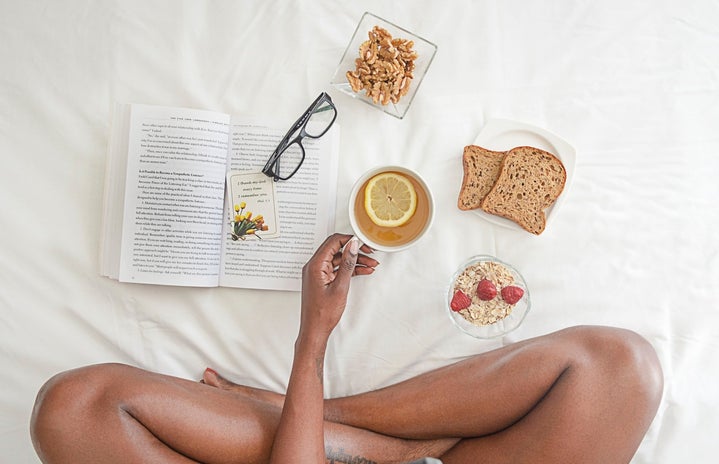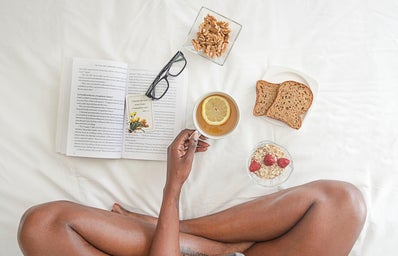@barry_happy said: “When say you can’t love anyone until you love yourself- listen, I get it, they’re wrong. You can. But it will have its flaws.”
We tend to reserve sexual and romantic intimacy for certain people or partners, and we reserve platonic intimacy for our friends and family, but how many of us can say that we practice intimacy towards ourselves? I believe that most of the time, in order to get to know others deeply, we need to know ourselves just as well or better. As social creatures, our abilities to connect and form bonds are unparalleled, but we tend to falter in our talents when it comes to knowing and appreciating ourselves, in all our bodies, minds, and spirits.
Self-intimacy comes from the idea that you are the longest relationship you will have in your lifetime, and you should spend that time getting to know yourself inside and out. We all have our faces that we present to the world, to our partners, our friends and family, and to the people who love us. As we get to know and trust the people in our lives, our faces transform to become a little more worn down, much more tired and less shiny, but a lot truer to ourselves. We learn to lean on our people, and ask for help, and to ask for support, guidance, love, or a gentle touch. What we ask of other people, we need to learn to ask of ourselves as well.
- Body Neutrality/Acceptance
-
As contradictory as it sounds, one of the hardest ways to connect with ourselves is through our bodies. We are bombarded with different messages every day, from our friends and family, from social media and influencers, and from companies who want to sell you a better body in a bottle. If we acknowledge the beauty of our bodies, it’s normally through the idea that we are sexually appealing or beautiful. If we acknowledge the limitations and flaws of our bodies, we are often encouraged to get rid of them. And most of us fall under the latter category.
And that’s where body neutrality comes into play.
You’ve probably heard the saying: “If you have nothing nice to say, don’t say anything at all.” Try treating your inner thoughts that way as well. I think it’s unrealistic to expect to wake up one day and suddenly love everything you hated about yourself, but you can work towards saying nothing subjective about your body. Instead of focusing on the thigh gap you’ve never had, simply acknowledging that you have legs and thighs refocuses your inner narrative. Instead of focusing on your acne scars or blackheads, acknowledge their presence and move forward. You don’t need to make every blemish and bump, butt dimple, and uneven hip dip into something poetic. You can acknowledge that they exist, but they do not control your inherent value.
- Pleasure and Health
-
When you acknowledge your physical body, you can start to realize how its connected to the inner workings of you. To be intimate with yourself, you need to be intimate towards the physical form you present to the world. If you can, reacquaint yourself with your body. Feel the unevenness, that dry patch you just can’t get off, and listen to the clicks in your elbow that never fully recovered from that accident in grade five. Take a minute to listen to your breathing, and feel your pulse. Stick all your fingers in between your toes. Touch the waxy part in your ears. Feel the razor burn, and look at the unevenly cut fingernails. Touch all the parts of your body that, at some point in your life, has helped get you to where you are now, emotionally and physically.
Take pride in it. No one comes out on the other side perfectly. You owe it to yourself to stop putting your pleasure and your health (which are not mutually exclusive) on hold until you lose ten pounds, until you get Invisalign, or get yourself waxed and smooth. Take the time to know your body, so that if you notice or feel anything different, you trust yourself enough to go to a medical professional and/or trusted person. You need to know yourself well enough that if someone disregards your physical feelings, you can stand up for yourself. You need to be on your side.
Take your self-intimacy seriously. Get to know yourself in the ways you have allowed others to get to know you. Take yourself into your own hands.
- Be Your Healthiest Relationship
-
As we go through life, our relationship with ourselves and all our pieces goes through ups and downs just like everything else. It is unrealistic to expect ourselves to be kind to ourselves every day, especially when the rest of life seems to be going wrong, and you want someone to be angry at. How we treat ourselves when we are at our worst is more important than how we treat ourselves when we’re feeling good. We do the most damage to ourselves when we feel like we are disposable and valueless. Being in a health relationship with yourself does not mean you have to like yourself every day, but it does mean that you have to try and treat yourself in the ways that you need. And the ways that you need to be always treated begins and ends with kindness.
Ask yourself what you would ask of your closest people. Root for yourself. Look at yourself in the mirror, and consider what you need from yourself, what you are not giving yourself, and how you’re going to improve and fix your relationship. Being stern with yourself because you deserve better can be as healthy as being forgiving yourself for falling short of your expectations. It’s only through failure and mistakes that you learn how to treat yourself with respect, dignity, and patience.
Self-intimacy is a deep, and vulnerable, understanding of your strengths, your shortcomings, your vast abilities, and your human limitations. It is a reckoning with yourself.



